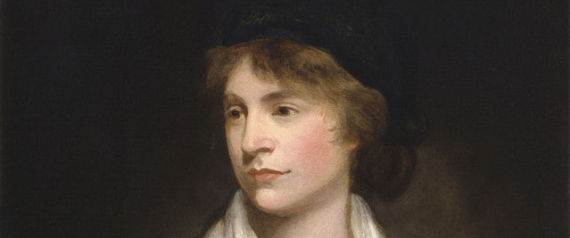
Mary Wollstonecraft (1759-1797). That's all I say and instantly my college students' eyes roll back in their heads. It's the first day of class -- Women and Literature -- and already they're bored. They text their friends, keeping their phones hidden under their desks, thinking I can't see. When I ask if they've ever heard of Wollstonecraft, they all shake their heads no. They don't look particularly interested in finding out more.
I don't judge them. Or, at least I try not to. When I was their age, I'd never heard of Wollstonecraft, either. Years later, when I found out that she was an early campaigner for women's rights, I gave her my gratitude, but only grudgingly, the way you thank a great aunt who has given you wool socks, or a sturdy set of sheets, something necessary. I had my rights. Thank you, Mary Wollstonecraft. But let's move on. What do you have to do with my life now?
It turns out just about everything. The fact that I am a professor and that I am teaching a class called Women and Literature to a classroom full of women students stems directly from Wollstonecraft. In an era when experts deemed women's brains too weak for rational thought, and their constitutions too fragile for disciplined work, Wollstonecraft wrote A Vindication of the Rights of Woman. She argued that women had the right to an education and the right to live independent lives. I try to tell my students that she wrote to make life better for us, the women of the future, and there is, perhaps a brief flicker of interest, but just then a fly buzzes against the closed window, and they swivel to watch its desperate attempts to get out of the classroom. Anything is more interesting than Wollstonecraft.
But then I relate some scary facts:
When Mary Wollstonecraft was alive, if you were a woman and got married, you could not own your own property. You could not have your own money or your own house. Your children were considered your husband's property. If you did anything your husband didn't like, the law held that he could beat you. In fact, he was supposed to beat you, as a husband who did not punish an unruly wife was considered weak, unable to restrain a woman's destructive tendencies. He was his wife's governor, her legal representative, and her economic master. Enraged at this systemic injustice, Wollstonecraft broke the law by rescuing her sister from an abusive husband -- a term that did not exist back then. There was no such thing as marital rape, since men had the right to have sex with their wives whenever they wanted. Divorce was almost impossible, requiring an act of Parliament, and could never be initiated by a woman. Advice columnists argued that it was dangerous to let women have too much freedom. Females were silly enough to destroy themselves, their lovers, their families, and even the state. And so, when Wollstonecraft had the nerve to argue for women's independence, she was castigated as a whore, a "hyena in petticoats."
My students perk up at this recital of unthinkable deprivations.
"When was this?" one asks.
"It must've been a long time ago," another one declares.
They are alarmed and astonished when I tell them that some of these laws were still on the books less than 100 years ago.
"Well, we don't live like that now," they say hastily. "We have our own money. We can get jobs, go to school. We can get divorced. Rape's a crime."
But then there's a pause, and one student says, "There's still sexual assault on campuses."
"Yes," says another, "and men still make more than women."
They discuss current inequities between modern men and women and decide that we have made strides as a culture, but that we still have a ways to go.
"The most dangerous thing," one student says, "is how women buy into the system."
"It makes you more attractive to a man, if you act dumb," another one says, "Sometimes we pretend not to know things, so we don't threaten anyone."
Unfortunately, my students are onto something. In a recent article for The New York Times, Sheryl Sandberg and Adam Grant cite a study conducted by Yale psychologist, Victoria L. Brescoll, in which women executives who spoke more than their peers received lower competence ratings. Sandberg and Grant conclude, "women who worry that talking 'too much' will cause them to be disliked are not paranoid; they are often right."
Twenty-first century women may possess many of the rights that Wollstonecraft called for in a Vindication of the Rights of Woman, but they still face deep cultural prejudices. All too often, women who speak their minds are viewed as "hyenas," albeit no longer in petticoats.
Charlotte Gordon it the author of Romantic Outlaws: The Extraordinary Lives of Mary Wollstonecraft and Mary Shelley.